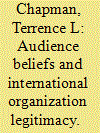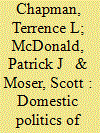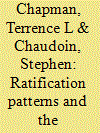|
|
|
Sort Order |
|
|
|
Items / Page
|
|
|
|
|
|
|
| Srl | Item |
| 1 |
ID:
092087


|
|
|
|
|
| Publication |
2009.
|
| Summary/Abstract |
Recent work suggests that multilateral security institutions, such as the UN Security Council, can influence foreign policy through public opinion. According to this view, authorization can increase public support for foreign policy, freeing domestic constraints. Governments that feel constrained by public opinion may thus alter their foreign policies to garner external authorization. These claims challenge traditional realist views about the role of international organizations in security affairs, which tend to focus on direct enforcement mechanisms and neglect indirect channels of influence. To examine these claims, this article investigates the first link in this causal chain-the effect of institutional statements on public opinion. Strategic information arguments, as opposed to arguments about the symbolic legitimacy of specific organizations or the procedural importance of consultation, posit that the effect of institutional statements on public opinion is conditional on public perceptions of member states' interests. This article tests this conditional relationship in the context of changes in presidential approval surrounding military disputes, using a measure of preference distance between the United States and veto-wielding members of the UN Security Council. Findings indicate that short-term changes in presidential approval surrounding the onset of military disputes in the United States between 1946 and 2001 have been significantly larger when accompanied by a positive resolution for a Security Council that is more distant in terms of foreign policy preferences. The article also discusses polling data during the 1990s and 2000s that support the strategic information perspective.
|
|
|
|
|
|
|
|
|
|
|
|
|
|
|
|
| 2 |
ID:
138305


|
|
|
|
|
| Summary/Abstract |
We present a formal model of international bargaining between two states in which one government must negotiate with a domestic opposition faction to secure tax revenue for military spending. The model examines how robust the international order is to domestic political crises that activate a stark trade-off to a governing coalition. Namely, offering fiscal relief to stave off domestic revolution can simultaneously undermine the larger international political order by facilitating military spending that can, under some circumstances, result in sizable shifts in the relative distribution of military power between states. We find that two key domestic conditions influence the likelihood of preventive war: the distribution of income within the state's economy and the relative economic stake that opposition groups possess in international settlements.
|
|
|
|
|
|
|
|
|
|
|
|
|
|
|
|
| 3 |
ID:
137117


|
|
|
|
|
| Summary/Abstract |
In “Information and Institutions Revisited,” Fey et al. point out some corrections to the equilibrium analyzed in Chapman. In this brief response, we argue that while these corrections are appropriate, they do not address the larger substantive question of when conditions exist that would facilitate information transmission between an international security organization and a domestic audience. We show an equilibrium in which the core logic of the information transmission argument in Chapman remains. We also discuss the particular modeling choices that facilitate information transmission (or prevent it) in equilibrium.
|
|
|
|
|
|
|
|
|
|
|
|
|
|
|
|
| 4 |
ID:
077071


|
|
|
|
|
| Publication |
2007.
|
| Summary/Abstract |
Scholars have devoted considerable attention to the informational role of international institutions. However, several questions about the informational aspects of institutional behavior remain underexplored: What determines how audiences respond to institutional decisions? Through what channels does information provision affect foreign policy? To answer these questions, I develop a formal model motivated by recent literature on the informational effects of security institutions. The formal model depicts information transmission between a domestic audience, an international institution, and a foreign policy maker. Statements issued by member states through the institution serve to inform the audience about the likely outcomes of its leader's actions. The model demonstrates that leaders have incentives to consult relatively conservative institutions, because their support convinces audiences that they should also support proposed policies. Leaders face incentives to avoid the disapproval of more revisionist institutions, because their opposition will tend to induce public opposition. The empirical implications are discussed
|
|
|
|
|
|
|
|
|
|
|
|
|
|
|
|
| 5 |
ID:
120879


|
|
|
|
|
| Publication |
2013.
|
| Summary/Abstract |
What types of countries have ratified the Rome Statute establishing the International Criminal Court? Because the court relies on state cooperation, it is a good example of a regime facing a "participation problem." In order to be effective, the regime requires active members, but states that fear regime effectiveness will therefore find it potentially costly to join. We analyze the extent to which this problem plagues the ICC. We find that countries for whom compliance is likely to be easiest-democracies with little internal violence-are the most likely countries to join the ICC. On the other hand, countries with the most to fear from ICC prosecution, nondemocracies with weak legal systems and a history of domestic political violence, tend to avoid ratification. We contrast our findings with those of a recent article by Simmons and Danner (2010), arguing that ratification patterns show evidence of credible commitments. Our analysis across a breadth of evidence, both descriptive and multivariate, suggests caution toward arguments about the impact of the ICC on global practices and provides support for the notion that states strategically select themselves into supranational judicial agreements.
|
|
|
|
|
|
|
|
|
|
|
|
|
|
|
|
| 6 |
ID:
083535


|
|
|
|
|
| Publication |
2008.
|
| Summary/Abstract |
Does a vibrant civil society lead to a more peaceful society? The notion that inclusive civic institutions can facilitate peaceful conflict resolution has become a cornerstone of economic development efforts, but little rigorous work tests this proposition. One obstacle to confirming this popular notion is the endogeneity of these institutions. It is difficult to tell whether civic institutions influence behavior or whether individuals who join civic institutions are a priori less likely to believe in using violence to achieve political goals. Cross-national quantitative analysis systematically examines this relationship, finding that many common demographic factors affect individuals' participation in civic associations, but that membership in such associations plays little or no role in determining individual attitudes toward political violence. These results bear directly on debates in the scholarly and policy world about how best to create the conditions for a peaceful democratic society
|
|
|
|
|
|
|
|
|
|
|
|
|
|
|
|
|
|
|
|
|